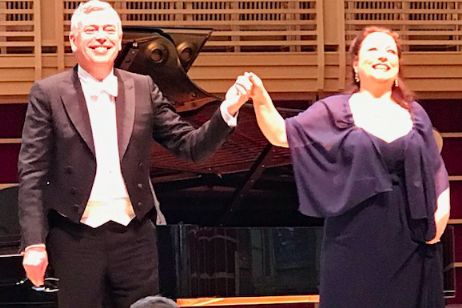|
Symphony
FROM THE NEW WORLD TO THE OLD WORLD
by Peter Lert
Saturday, June 14, 2025
Chamber
MC2 DUO RECITAL CLOSES 222'S SEASON
by Terry McNeill
Saturday, June 14, 2025
Choral and Vocal
CANTIAMO SONOMA'S LUSCIOUS A CAPELLA SINGING IN SEASON ENDING CONCERT
by Pamela Hicks Gailey
Sunday, June 8, 2025
Symphony
SRS SEASON ENDS WITH RESOUNDING TA-TA-TA-BANG
by Terry McNeill
Sunday, June 1, 2025
Symphony
YOUTHFUL VIRTUOSITY ON DISPLAY AT USO'S MAY CONCERTS
by Peter Lert
Saturday, May 17, 2025
Symphony
MYSTICAL PLANETS AND LIVELY GERSHWIN ORTIZ AT FINAL SRS CONCERT
by Peter Lert
Sunday, May 4, 2025
Symphony
VSO'S CONCERT MUSIC OF TIME, MUSIC OF PLACE
by Peter Lert
Sunday, April 27, 2025
VOCAL ELEGANCE AND FIRE AT THE 222'S RECITAL APRIL 26
by Pamela Hicks Gailey
Saturday, April 26, 2025
CANTIAMO SONOMA SINGS AN INSPIRED GOOD FRIDAY MOZART REQUIEM CONCERT
by Pamela Hicks Gailey
Friday, April 18, 2025
DRAMATIC SHOSTAKOVICH SYMPHONY CLOSES PHILHARMONIC'S 25TH SEASON
by Terry McNeill
Sunday, April 13, 2025
|
 |
 Malcolm Martineau and Dorothea Röschmann Feb. 18 in Weill Hall (J. McNeill photo) |
SOMBER GERMAN POETRY IN SONG AT ROSCHMANN RECITAL
by Terry McNeill
Sunday, February 18, 2018
Two weeks does make a hefty difference. Feb. 3 saw the diva Renée Fleming beguile a full Weill Hall house in a mix of Brahms, Broadway show songs and Dvorak chestnuts. It was a gala event with couture gowns and colorful extra-musical communication between singer and her rapt audience.
Dorothea Röschmann’s Feb. 18 recital from the same stage was sharply different, though the respective pianists (Helmut Höll and Malcolm Martineau) were uniformly excellent. The German soprano said not a word to the 250 in Weill, sang only in her native language, and with Mr. Martineau selected a program short on easy charm and long on somber and intense artistry.
Schubert wrote most of his Mignon Lieder during his final decade, and the stage was set for an afternoon of engaging but often melancholic lyricism. The four works, with an attached “Nachtstücke,” were sung with exemplary diction and palpable sadness. Only the second (“So last mich scheinen”) had much light with its simple piano part, and the third (“Nuf wer die Sehnsucht kennt”) with the soprano’s effortless drop of two octaves were out of character. The finale (“Kennst du das land?”) was sung in a faster tempo with a big final note.
“Nachstücke” (D. 672) was also somber but was sung beautifully, beginning with a delicate piano prelude and following graded arpeggios, and ending with Ms. Röschmann’s accurate attacks and handling the modulations with just the slightest use of ritards.
Mahler’s Rückert Lieder closed the first half, a group of five songs recounting bucolic suffering. Many singers begin with “Ich atmet’ einen linden Duft,” but Ms. Röschmann made it the second song, and with it the “real” Mahler was gloriously heard. So much of the music echoes the contemporary Kindertotenlieder cycle, and the singer gave each a dose of mystery and longing, with “Um Mitternacht” generating the first sonic majesty of the recital. The many descending piano lines captured the mystery of the poetry. The “Blicke mir nicht in die Lieder” was performed with references to the composer’s less heavy Fourth Symphony, and the music in the final (“Ich Bin der Welt”) was slowly performed, an anguished lament and a sad journey.
This haunting Mahler finale was carefully sung, provoking a far off vision, with the pianist able to terrace soft dynamics and Ms. Röschmann nailing a soaring high note that quietly broadened into a long pensive postlude. This was perhaps the recital’s highlight.
Schumann’s rarely performed Marian Stuarda Lieder opened the second half, and though beautifully sung it passed without the emotional heft of the previous Mahler and the Wagner to come. The harmonies were echt Schumann and the fourth and fifth songs the most convincing – “Abschied” (a complicated song, with many small soprano touches) and the declamatory operatic drama of “Gebet.”
Schumann’s short cycle was swept aside in the concert’s concluding Wesendonck Lieder, Wagner’s passionate five-part grouping composed in 1857. Ms. Röschmann’s operatic credentials immediately were on display in “Der Engel,” a stunning ray of vocal sunshine after so much mournful musical travail. The slow tempos were perfect gauged, the big climaxes never forced or shrill. This continued in “Stehe Still!” and the Tristan Prelude-themed “Im Treibhaus.” The soprano’s low notes over a piano tremolo in the latter were richly hued, and the constantly returning theme was transfixing in a haunting ensemble. Mr. Martineau never covered the singer, and his subtle accents in major-minor key changes were ever persuasive.
In response to a standing ovation one encore was offered, Liszt’s short “Es Mus Ein Wunderbares Sein” (a wonderous rapture must it be). As all through this recital, it was sung with consummate mastery, including a novel long pause before the a tempo marking (Vom ersten kuss). Praise can go no higher.
The Green Music Center producers provided extensive notes and translations, the house lights were kept up, and with the late afternoon window luminosity people could easily follow the printed poetry.
|

